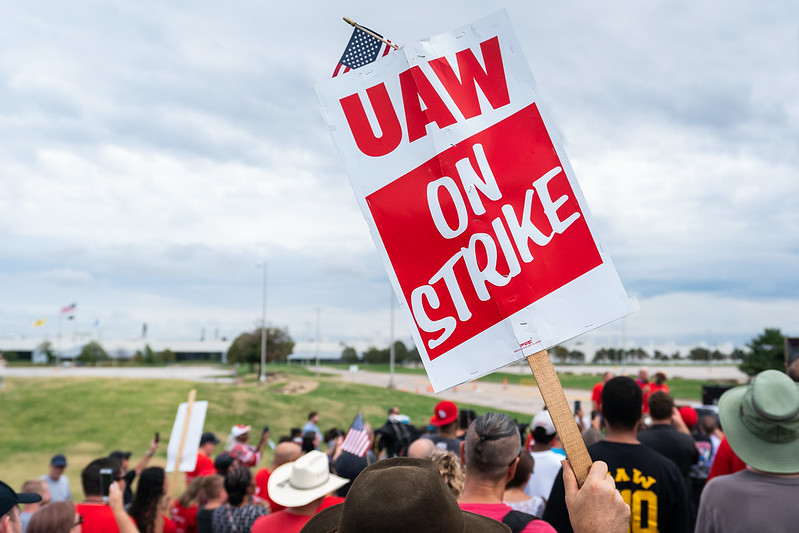For the first time in 88 years, the United Auto Workers union has gone on strike against Detroit’s three powerful automakers.
The UAW’s recent labor pact with the Detroit Three — General Motors, Ford Motors and Stellantis N.V. (formerly known as Chrysler) — expired at 11:59 p.m. Eastern Standard Time on Sept. 14.
Though some progress was made through weeks of negotiations between the companies and the UAW, a deal meeting all the UAW’s demands was not reached by the deadline. These demands included a 46% raise, restoring cost-of-living increases, the abolition of a tiered wage system where newer workers earn less, expansive health care and greater pension disbursements.
The new UAW President Shawn Fain, who originally threatened and spearheaded the strike, won the position by a couple hundred votes against the incumbent President Ray Curry. Given his narrow victory, Fain’s margin of error with the nearly 150,000-strong union is slim, hence why he even called the UAW’s proposals “audacious.”
Fain was firm, however, in maintaining that the proposals were fair given that the Detroit Three had undergone one of their most profitable periods in history. GM alone made $200 million over the last nine years. Yet, as Fain points out, “Our wages went backwards. There’s something wrong there.”
Fain feels further compelled to set lofty expectations due to the previous UAW administration’s corruption scandal, where 13 officials were caught and convicted of pocketing union dues for personal purposes. The officials agreed to weak contracts with the Detroit Three, enriching themselves while leaving auto workers in a state of economic uncertainty.
After President Joe Biden invited the UAW President to The White House last month, Biden wished for a “fair transition” from the production of gas-powered vehicles to electric vehicles, adding that factories should offer comparable wages and give greater preference to existing auto workers to fill in new jobs. Nevertheless, in the final days leading up to the deadline, Biden expressed concern about a potential strike.
“Let’s be clear: no one wants a strike,” Biden stated shortly after the clock had struck midnight and workers were set to take to the streets. “But I respect workers’ rights to use their options under the collective bargaining system.”
Despite the seemingly “pro-union” stance Biden took early on Sept. 15, the 46th President has received growing criticism for his passivity and unwillingness to take a firmer side, especially after supporting a “win-win” scenario between workers and auto companies.
Biden’s lack of urgency in avoiding gridlock was partly to blame for the strike. The auto companies had already secured favorable terms, while auto workers have not received similar benefits to other unions nationwide.
Biden also received criticism from members of the Republican party, most notably from former President Donald Trump, who said “The autoworkers will not have any jobs… because all of these cars are going to be made in China.”








